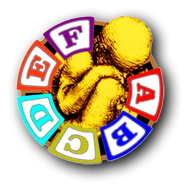
The Children of the Code Project is a ‘case in point’ for how poorly our society understands learning and the personal and societal costs of unhealthy learning. Consisting of over 100 interviews with field leading scientists and scholars the COTC project has produced over 140 video segments that cover subjects ranging from the origin of writing to the neurology involved in producing the virtual language experience we call reading. Click here for more background on the project or here to go to it’s home page.
If you are coming in from the Children of the Code website or with reading oriented concerns Click Here to go to “COTC: Phase 2”.
Special Offer on all DVDs and Digital Video collections from the Children of the Code Project to all subscribers to Learning Stewards: we are offering 1/3 off discount off all our DVDs and Digital Video Collections to anyone has subscribed to receive (free) updates from Learning Stewards. For more details, click here.

I created a digital dictionary replacing phonetic spellings using diacritical marks or ITA with real spellings for each English sound. (I had to create one phonetic spelling for the one sound that has no spelling of its own.) I also created new sequences and methods for learning phonics, reading, spelling and grammar with poems, songs, games, virtual world designs, etc. I’d like to find out if our methods could enhance each other’s ways of learning.
Hi Marilyn, Thank you for your message and for your efforts. I think what we are doing already includes and then transcends what you are describing. Please have a look at “How Do Kids Learn to Read? What the Science DOESN’T Say!” and Interactive Orthography and perhaps one of our many Ebooks. If after you have a better sense of what we are doing you have an idea about how we might collaborate we’d very much love to hear it. Thanks
Hi David,
Thanks for responding. To improve teaching of reading and spelling is my passion so I have read those items you mentioned and many others you and your colleagues wrote.
I’m an independent curriculum developer. I’ve taught preschool through university and adult levels. I did extensive searches of a digital dictionary decades ago to find all the spellings for each sound and all pronunciations for each spelling. Lists produced by these searches fascinated me as a scholar, but bored most people. So, also being a writer and artist, I turned them into illustrated song verses, stories, poems and games to make them fun for beginner through adult levels.
I created digital and paper versions of a dictionary arranging words by spellings and also by sounds to make them easier to find if you can’t spell them. Each sound’s pronunciation is a REAL SPELLING (except one sound having none so I created one). No marks or irregular shapes are used. I call these spellings their CLUE SPELLINGS. If programmed, it could be used as yours is to instantly help read digital words by placing any word’s CLUE SPELLING under it in paper and digital versions.
I want collaboration, not competition, so if any of these pronunciations can help deciphering goals, I want to make them available. These CLUE SPELLINGS can also be used to help spelling reform when we revive that movement!
For my new reading, spelling and grammar sequence I created fun songs, activities and games that use ONLY ONE SPELLING FOR EACH SOUND to build confidence before a learner confronts our many English spellings. As students become ready for them, each spelling is clearly explained with cartoons, verses and games. The students of various ages using this series have found it very effective.
Do you know of any program using this easier sequence to build confidence quickly?
I’ve also created new ways to teach math. Each math operation and numeral 1-10 and 100 is an animal. All explain their functions with songs, kinetic tools, body movements and games.
I plan to expand this fun learning into virtual worlds, software and a TV series. It will take a team of artists, musicians, animators, etc. to complete. If you want to see more of my work and think it can help people of various ages, I can send you an overview of it. I can also call you or discuss it online. I’m eager to hear ideas on whom to contact to help share it with the world.
Marilyn
HI Marilyn,
You said: “Reading and spelling is my passion so I have read those items you mentioned and many others you and your colleagues wrote.”
With respect, that doesn’t feel genuine to me. It feels like a template response. There may indeed be ways we might collaborate but they begin with you demonstrating that you really have experienced and understood what I shared. Alluding to reviving spelling reform shows a complete disconnect with what we are doing and what we are about. It’s inevitable that future education will use digital orthography in some form that makes every word a learner encounters its own reading tutor, reference librarian, and language translator. Once every word a learner encounters (during the process of learning to read) can help them with whatever they might need – immediately – will learners still benefit from abstract offline drills anything like we use today? Yes, but radically less and those used will function in support and in alignment with the more pervasive orthography based learning system.
I almost disallowed what you were sharing as spam. I decided not to because I believe you about your passion because I have such a passion too. If after understanding what I shared (“How Do Kids Learn to Read? What the Science DOESN’T Say!”, Interactive Orthography, our many Ebooks) you have a suggestion about how we might collaborate in some way that integrates our respective offerings I would love to hear it. If not, I wish you all the best.